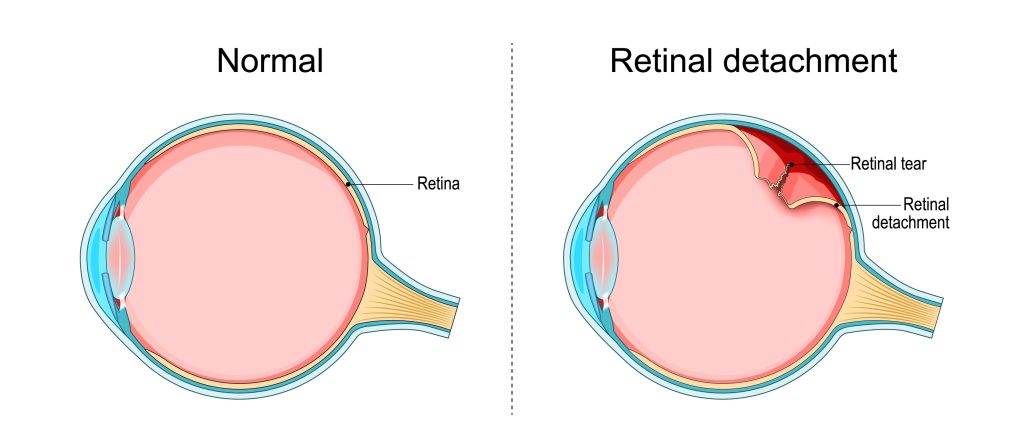Retinal Cryotherapy in Baltimore
Also serving Pikesville, Catonsville, Glen Burnie, & Rosedale
At the Elman Retina Group, we provide advanced vision and eye care to each of our patients. Our team provides a private, comfortable atmosphere for our patients. When you visit us, we’ll talk about the specific needs you have to improve your vision or preserve it. One of the types of advanced vision care we offer is retinal cryotherapy. Drs. Elman and Schechet offer top-notch service using state-of-the-art techniques to enhance your vision.
What Is Retinal Cryotherapy?
Retinal cryotherapy is a type of procedure that uses very cold temperatures to create a chorioretinal scar and destroys the retinal tissue. The retina is a thin membrane located at the back of the eye. It works like the film in a camera. Images come in from the cornea, or lens, at the front of the eye. The light is shaped by the cornea and then lands on the retina. The retina is held in place at a ring located behind the lens. This is called the pars plana. The retina is directly connected to the optic nerve towards the back of the eye. The retina works to collect information from the light streaming into the eye and then sends it to the optic nerve which transfers it to the brand.
However, some people may experience damage or disease to the retina. Retinal cryotherapy can help in a variety of conditions including in:
- The retina detaches or breaks away
- There is retinal tissue that becomes damaged from a lack of oxygen, called retina ischemia
- The blood vessels in the retina become damaged, called neovascularization
- Intraocular tumors develop, called retinoblastoma
- Coats’ disease occurs, a condition in which the retinal blood vessels are abnormal in structure and cause a loss of vision
How Can Your Ophthalmology Team Help You?
As retina specialists, our ophthalmologists may recommend the use of retinal cryotherapy. We’ll provide a full examination of your eyes as a first step. Then, we may recommend this treatment if we feel it is the best way to protect your vision.
The procedure involves a local anesthesia applied to the area. Then, the procedure will begin with the placing of a metal probe against the eye. The very tip of the probe becomes very cold. The probe is properly placed in the location of the area of concern. This allows for water crystals to develop. This leads to tissue destruction. Once complete, this encourages healing and then the formation of scar tissue. Depending on the type of concern you have, different methods may be used. The sooner this treatment is applied, the more likely it is to improve or protect vision. It’s important to have a routine eye exam to ensure your vision can be monitored.
Preparing for Retinal Cryotherapy
Before retinal cryotherapy, your eye doctor will perform a thorough examination of your retina to assess the extent of any tears, detachments, or lesions. You may need to stop using certain medications, particularly blood thinners, to reduce the risk of complications. You should arrange transportation home from your appointment, as vision may be impaired temporarily after the procedure. On the day of the treatment, avoid wearing makeup or contact lenses. It’s also important to discuss any allergies or sensitivities with your doctor to ensure the procedure goes smoothly.
Costs of Retinal Cryotherapy
Cryotherapy is an in-office based procedure and typically for urgent retinal pathologies such as retinal tears, tumors, and more. Insurance often covers the procedure but be sure to check with them. Of course, our office team is always happy to help you better understand your specific coverage and policies.
Recovery After Retinal Cryotherapy
After the procedure, it’s common to experience mild discomfort, swelling, or blurry vision. These symptoms generally resolve within a few days. You will be advised to take it easy, avoid heavy lifting, and protect your eyes from strain during the recovery period. Your doctor will likely prescribe eye drops to reduce inflammation and prevent infection. Follow-up appointments are crucial to monitor healing and ensure the retina is responding to the treatment. Most likely, you will feel well enough to return to normal activities within a week, but it’s important to adhere to your doctor’s specific post-operative care instructions.
Results of Retinal Cryotherapy
Retinal cryotherapy is highly effective in treating retinal tears, detachments, tumors, and certain eye conditions that threaten vision. By creating a controlled scar, the procedure helps to seal off retinal tears and prevent fluid from accumulating under the retina, reducing the risk of retinal detachment. Many patients experience significant improvements in their vision stability and long-term eye health. However, in some cases, additional treatments may be necessary to fully resolve the issue. Your doctor will guide you on the expected outcomes based on your specific condition.
Is Retinal Cryotherapy the Best and Only Way to Treat Retinal Tear or Retinal Detachment?
Retinal cryotherapy is a highly effective and widely used treatment for retinal tears and detachments, but it is not the only option. Depending on the severity of the condition and individual patient needs, other treatments such as laser photocoagulation or even surgery may also be recommended. There are many factors that the doctor considers when deciding the treatment plan, and sometimes more than one modality is used in a staged treatment plan.
 Choosing the best treatment depends on the location and size of the tear or detachment, as well as the overall health of your eye. Retinal cryotherapy is particularly beneficial for patients who need a quick and efficient method to seal retinal tears and prevent further detachment. However, your eye doctor will carefully evaluate your condition and recommend the most appropriate course of action to ensure the best possible outcome.
Choosing the best treatment depends on the location and size of the tear or detachment, as well as the overall health of your eye. Retinal cryotherapy is particularly beneficial for patients who need a quick and efficient method to seal retinal tears and prevent further detachment. However, your eye doctor will carefully evaluate your condition and recommend the most appropriate course of action to ensure the best possible outcome.

Schedule a Consultation with Your Ophthalmologist at Elman Retina Group Today
We have offices in Rosedale, Glen Burnie, and Pikesville, Maryland to meet your needs. To learn more about how retina cryotherapy can help you, contact our offices today for an appointment.



